|
|
|
Sort Order |
|
|
|
Items / Page
|
|
|
|
|
|
|
| Srl | Item |
| 1 |
ID:
152104
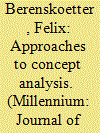

|
|
|
|
|
| Summary/Abstract |
This article takes as its point of departure Stefano Guzzini’s recent call for ‘ontological theorizing’ as a reflexive engagement with central concepts. In an attempt to advance this agenda, the article presents an accessible overview of different approaches to concept analysis to stake out the field for a discussion of what ontological theorising might entail. The article advances the notion of concepts as ‘basic’ and lays out the parameters through which they obtain meaning, followed by a discussion of three approaches, which tackle the multifaceted nature of basic concepts within and across different contexts. These approaches are labelled ‘historical’, ‘scientific’ and ‘political(critical)’ and presented through the work of Reinhart Koselleck, Giovanni Sartori and Michel Foucault, respectively. The article notes that concept analysis, as discussed here, stands in tension with modern forms of theory building yet is a creative source for theorising that accepts the unstable, political and context-bound nature of ontology.
|
|
|
|
|
|
|
|
|
|
|
|
|
|
|
|
| 2 |
ID:
029218
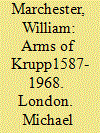

|
|
|
|
|
| Publication |
London, Michael Joseph Ltd, 1960.
|
| Description |
1053p.Hbk
|
|
|
|
|
|
|
|
|
|
|
|
Copies: C:1/I:0,R:0,Q:0
Circulation
| Accession# | Call# | Current Location | Status | Policy | Location |
| 002104 | 929.2/MAN 002104 | Main | On Shelf | General | |
|
|
|
|
| 3 |
ID:
101011
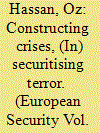

|
|
|
|
|
| Publication |
2010.
|
| Summary/Abstract |
The European Union's (EU) counter-terrorism strategy has been particularly dynamic, developing as a result of 'crises' and subsequent post-crisis narrations. The events of 11 September 2001, and the Madrid and London bombings have proved to provide moments of punctuation from which policy evolution and institutionalisation has followed. As a result of such crises, the EU has increasingly regarded terrorism as a direct challenge to the Union's role as a security actor and sought to institutionalise a diverse range of security governance technologies across its multiple pillars. Such an approach is noticeable for its qualitative difference compared to EU strategy pursued throughout the end of the twentieth century, and demonstrates an increased willingness for the EU to assert its role in the world. Yet, what is highly noticeable from the EU strategy and the proliferation of security governance technologies is the manner in which the EU has securitised 'terrorism' in the pursuit of internal, external and normative objectives. As a consequence, the EU has inflated the threat posed by terrorism, and increasingly attempted to 'Europeanise' its response. Evident in such a strategy however, is the manner in which counter-terrorism practices can generate greater insecurity inside and outside of the Union.
|
|
|
|
|
|
|
|
|
|
|
|
|
|
|
|
| 4 |
ID:
098432
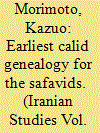

|
|
|
|
|
| Publication |
2010.
|
| Summary/Abstract |
Studies on the pre-dynastic claim of the Safavids to sayyid status suffer from a dearth of primary source materials. Scholars have advanced various conjectures, but it is not yet clear when the Safavids began to promote this claim or indeed when the so-called "official" Musavid genealogy was developed. This study presents a genealogical chart drawn in the third quarter of the fifteenth century (most probably in the 1460s) in Iraq (most likely in Najaf), which records the "official" genealogy in an unequivocal manner. This chart is a valuable document in that it testifies to the circulation of the "official" genealogy some three to four decades before the establishment of the Safavid dynasty. A survey of the studies to date on the question of the pre-dynastic claim is also offered in order to clarify the significance of the chart.
|
|
|
|
|
|
|
|
|
|
|
|
|
|
|
|
| 5 |
ID:
153541
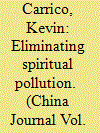

|
|
|
|
|
| Summary/Abstract |
Most histories have analyzed China’s 1983 Campaign to Eliminate Spiritual Pollution through the lens of elite politics. This article proposes a new interpretation of “spiritual pollution,” drawing upon anthropological theories of taboo and pollution to reinterpret the campaign’s role in reform-era culture and identity construction. The early reform era was a time of collapsing social borders that erased the obsessively delineated identities of the previous decades. Within this context, I reinterpret the struggle against spiritual pollution as an attempt to employ taboos to reinstate schematic boundaries in a world suddenly in flux. This process of post-Maoist boundary building particularly focused upon the distinction between “East” and “West,” as well as the distinction between the economic and political realms. The results of the campaign can still be seen today: the construction of a pure official identity based in overcoming Mao-era economic taboos alongside the perpetuation of political and cultural taboos.
|
|
|
|
|
|
|
|
|
|
|
|
|
|
|
|
| 6 |
ID:
115817
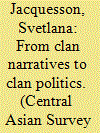

|
|
|
|
|
| Publication |
2012.
|
| Summary/Abstract |
This essay focuses on clan narratives as cultural tools in a particular sociocultural setting where mass literacy meets mass media. It shows how the interactions between different producers of clan narratives - the news media, the academic establishment and an intellectualist movement for the recovery of Kyrgyz history and culture - have resulted in a profound reshaping of the content of clan genealogies, of the claims of their compilers and, more significantly, of the ways various social actors relate to clan identities. Based on these analyses, it is argued that social representations and social practices related to genealogy and clans have undergone significant changes over the last 15 years, and that the production and consumption of clan narratives have played a crucial role in this transformation.
|
|
|
|
|
|
|
|
|
|
|
|
|
|
|
|
| 7 |
ID:
121823
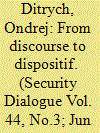

|
|
|
|
|
| Publication |
2013.
|
| Summary/Abstract |
This article is a historical study of how states have articulated statements about terrorism since the 1930s; under what conditions these statements have been articulated; and what effects the discourses made up of these statements have had on global politics. This includes the constitutive role of the present discourse on what is posited as a terrorism dispositif. The inquiry is inspired by Foucault's historical method, and comprises the descriptive archaeological analytic focused on the order of the discourse (including basic discourses in which the terrorist subject is constituted) and the genealogical power analysis of external conditions of emergence and variation of discursive series, whose treatment benefits also from Carl Schmitt's concept of the nomos.
|
|
|
|
|
|
|
|
|
|
|
|
|
|
|
|
| 8 |
ID:
123488


|
|
|
|
|
| Publication |
2013.
|
| Summary/Abstract |
This paper examines the way the outcaste head Danzaemon, or more precisely several individuals who successively bore that title, negotiated their place in the eighteenth-century Edo status order through official genealogical pronouncements. Eta and hinin groups became closely linked together in the political imaginary in Edo from around the beginning of the eighteenth century in an extraordinary legal battle that emerged between the leaders of these groups. The head of the former group, Danzaemon Chikamura, achieved a qualified victory in this struggle through genealogical posturing, positioning himself at the apex of an increasingly well-defined Edo outcaste order. By the second half of the eighteenth century, the privileged place within the order held by the next Danzaemon came under renewed pressure from a new generation of hinin. As a result, Danzaemon Chikasono made an attempt to rearticulate the grounds for his status through a different kind of genealogical statement. This article, using the official correspondence between Danzaemon and the Edo City Magistrate, examines the distinctive features of the genealogical imaginations of these two outcaste leaders in order to reveal the ways they negotiated their place within the Edo outcaste order.
|
|
|
|
|
|
|
|
|
|
|
|
|
|
|
|
| 9 |
ID:
105650
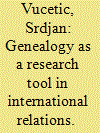

|
|
|
| 10 |
ID:
086776
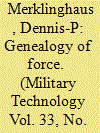

|
|
|
|
|
| Publication |
2009.
|
| Summary/Abstract |
In the beginning, harmony: tribes of human beings live as one, gathering and eating and playing and sleeping and singing and making love and telling stories together. And, occasionally,discord:an argument breaks out,strong words are exchange, a blow is struck.
|
|
|
|
|
|
|
|
|
|
|
|
|
|
|
|
| 11 |
ID:
153020
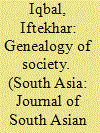

|
|
|
|
|
| Summary/Abstract |
This paper explores the anxious and sometimes hostile relationship between modern forms of civil society and non-modern institutions in Bangladesh. I argue that an uneasy relationship arises from civil society's inability or lack of initiative to identify and negotiate with ‘pre-modern’ social institutions and their remnants, which I conceptualise here as samaj. Such dissonance and disengagement have been historically constructed largely with regard to the way in which the roles of the state, capital and market forces have been conceptualised at the interface between ‘modernity’ and ‘tradition’. This proposition demands a genealogical understanding of the relationship between civil society and samaj, in which the latter is represented by religious institutions such as the khanqah and the madrasa.
|
|
|
|
|
|
|
|
|
|
|
|
|
|
|
|
| 12 |
ID:
075322
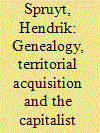

|
|
|
|
|
| Publication |
2006.
|
| Summary/Abstract |
This essay argues that one can distinguish various generative explanations of the state and the international system. By discussing Benno Teschke's work it examines, and questions, whether the mode of production can be treated as ontologically primary to other domains - the political, military, or ideological spheres. The behavior ascribed to capitalist states as England does not comport with the empirical evidence. Instead this essay suggests that hybrid theories, which privilege no single category of causal variables, can provide more accurate insights. The argument that territorial acquisition and capitalism are antithetical applies more accurately to the advent of the international order of the post-World War II period.
|
|
|
|
|
|
|
|
|
|
|
|
|
|
|
|
| 13 |
ID:
096868
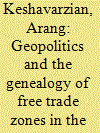

|
|
|
|
|
| Publication |
2010.
|
| Summary/Abstract |
Free trade zones have been championed by policy makers as important mechanisms for the "economic liberalisation" and "globalisation" of the Middle East. While a growing number of political economists have begun to investigate the performance of these projects, few have considered why states voluntarily limit their sovereign powers by establishing these liberalised territories. To address this question, this paper studies the Jebel Ali free trade zone in Dubai (UAE) and the Kish free trade zone in Iran, two of the earliest such projects in the region. Rather than being products of neoliberal ideology or pressure from advanced industrial economies, the essay argues that paradoxically these zones were developed by the Iranian state and Dubai emirate to project territorial sovereignty in turbulent geostrategic settings and moments as well as nodes to circulate rent to domestic and international members of ruling coalitions. The geostrategic and state-building logics informed when, where, and how these projects were developed. More generally, this analysis illustrates that the Middle East is neither absent from the process of globalisation, nor does it simply respond passively and reactively to this complex process. Free trade zones are an example of local strategies working in consort with international processes to fashion new forms of economic and political interconnectedness.
|
|
|
|
|
|
|
|
|
|
|
|
|
|
|
|
| 14 |
ID:
174656
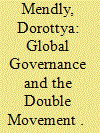

|
|
|
|
|
| Summary/Abstract |
This article reconstructs the evolution of global governance through time, in a perspective organized around Karl Polanyi’s double movement. Starting from present-day global governance, the article reaches back in time to understand the different socially and historically contingent layers that have constituted it as a discourse and a set of practices. It argues based on the notion that global governance is a hegemonic discourse of world politics, and claims that it is so because it has become inclusive enough to accommodate both the “movement” and the “countermovement” in its cognitive and material structures. In this order of knowledge, the “healthy functioning” of the global economy always precedes the existence of prosperous societies, and comes before maintaining harmony in the ecosystem. This order sustains the active-reactive dynamics of the double movement and limits the possibilities of change in global governance.
|
|
|
|
|
|
|
|
|
|
|
|
|
|
|
|
| 15 |
ID:
094587
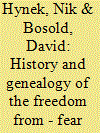

|
|
|
| 16 |
ID:
193227
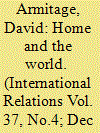

|
|
|
|
|
| Summary/Abstract |
The Finnish lawyer-historian Martti Koskenniemi’s new book, To the Uttermost Parts of the Earth: Legal Imagination and International Power, 1300–1870 (2021), is the culmination of a 30-year-long project to deconstruct and historicise the reigning assumptions of the profession of international law. This article evaluates To the Uttermost Parts of the Earth in the context of Koskenniemi’s larger critical project as well as within the historiography of international law from the late 19th century to the present. It argues that Koskenniemi’s genealogical method is revealing and frustrating in equal measure: frustrating in its diffuseness and lack of overarching argument but revealing in its scope, in its erudition and in its ambitions to disrupt traditional teleologies, to reveal the constraining force of legal language and to expose European dialogues between ‘domestic’ and international law over more than 500 years.
|
|
|
|
|
|
|
|
|
|
|
|
|
|
|
|
| 17 |
ID:
185057
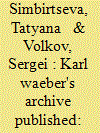

|
|
|
|
|
| Summary/Abstract |
This article is written on the occasion of the first publication in Germany in summer 2021 of a unique historical source, i.e., the family archive of Karl Ivanovich Waeber (1841-1910), a prominent Russian diplomat and Orientalist. The significance of this event for researchers can hardly be overestimated. The history of the establishment and development of official Russian-Korean relations at the end of the 19th century, as well as a number of important events in the history of Korea in the precolonial period, are inextricably linked with Waeber's name. However, although historians have been writing about his professional activities for decades, very little personal information about him was known until now, and there were no photographs of him at all. With the publication of the book by S. Bräsel, who is privileged to have found this archive, researchers for the first
|
|
|
|
|
|
|
|
|
|
|
|
|
|
|
|
| 18 |
ID:
174423
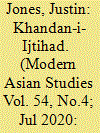

|
|
|
|
|
| Summary/Abstract |
Revisiting the debate on how Islam's ‘learned men’ (‘ulama) have sustained their religious authority through changing historical circumstances, this article offers a longue durée account of the so-called ‘Khandan-i-Ijtihad’: a family of renowned scholars and jurists who have held scholarly and popular precedence within South Asia's Shi‘i clerical networks for some 250 years. Instead of analysing the ‘ulama as a corporate group or a class of religious professionals, this article examines the ‘ulama as members of households (khandan, khanwadah) and emphasizes the important role of family lineage and inherited social influence as conduits of clerical leadership. Tracing both the genealogical succession and the vocational enterprises of this family over several generations, the article proposes a framework for understanding an individual scholar's relationship with the collective household, arguing that a cleric's own reputation (hasab-va-nasab) rests on a mingling of ancestral pedigree and personal achievement, with the stature of individual and household perpetually affirming and reinforcing each other in the making of Islamic clerical authority. Furthermore, the article establishes the importance of the ‘ulama-biography (tazkirah) as itself a mechanism for actively sustaining the relevance of contemporary ‘ulama, by perpetually memorializing their ancestors.
|
|
|
|
|
|
|
|
|
|
|
|
|
|
|
|
| 19 |
ID:
177584
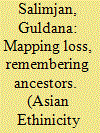

|
|
|
|
|
| Summary/Abstract |
Genealogical narratives are important aspects of Kazakh social life in China and the formation of self-identifications. They reflect tensions in competing forms of history-writing through which the Chinese state maintains control over its frontier. Through ethnography and critical analysis of locally produced and circulated genealogy books, this article traces the connections between genealogy as a way of knowing and its creative agency under the Chinese settler order in the Xinjiang Uyghur Autonomous Region. The article argues that Kazakh genealogy books as knowledge production are a response to Mao era assimilationist policies and reform era economic dispossession. Genealogy in this context mediates and mobilizes local histories, land epistemology, and gender ideals to construct Kazakh collective memory and belonging to ancestral places in northern Xinjiang.
|
|
|
|
|
|
|
|
|
|
|
|
|
|
|
|
| 20 |
ID:
132025
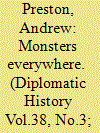

|
|
|
|
|
| Publication |
2014.
|
| Summary/Abstract |
This article, based on the 2014 Stuart L. Bernath Lecture, traces the emergence of "national security" as a foreign policy doctrine that came to define the safety of the United States in extremely broad terms, both geographically and ideologically. Doing so reveals that "national security" has its own history. The concept was invented by fusing long-standing, traditional concerns about U.S. territorial sovereignty with a newer, thoroughly revolutionary desire to protect and promote America's core values on a global scale. Franklin D. Roosevelt's legacy looms large in the history of American foreign relations, but it was his use of fear to invent the modern doctrine of national security that is possibly its most consequential aspect. After a couple of false starts, a fusion of geographical and ideological security took place during the world crisis of the late 1930s and the world war that followed. The results have defined U.S. foreign policy ever since.
|
|
|
|
|
|
|
|
|
|
|
|
|
|
|
|
|
|
|
|
|